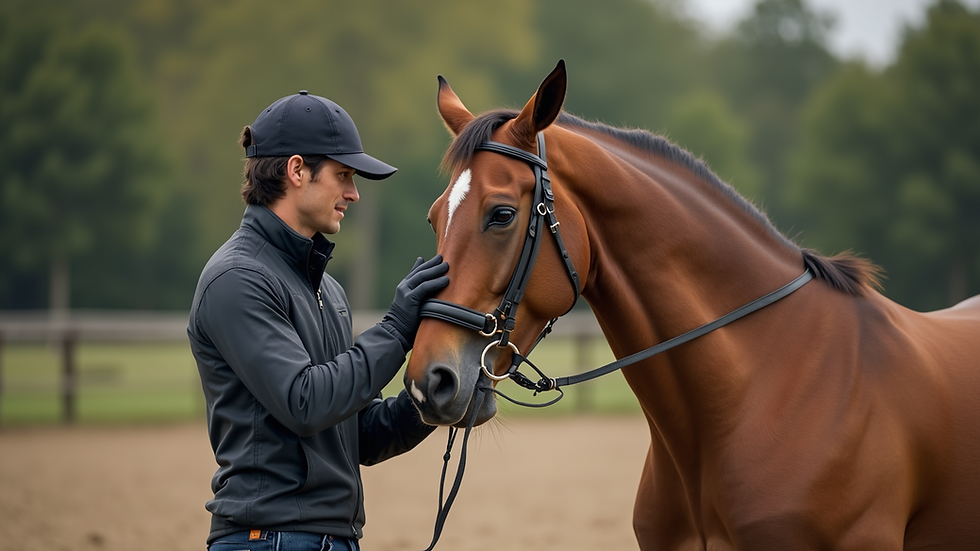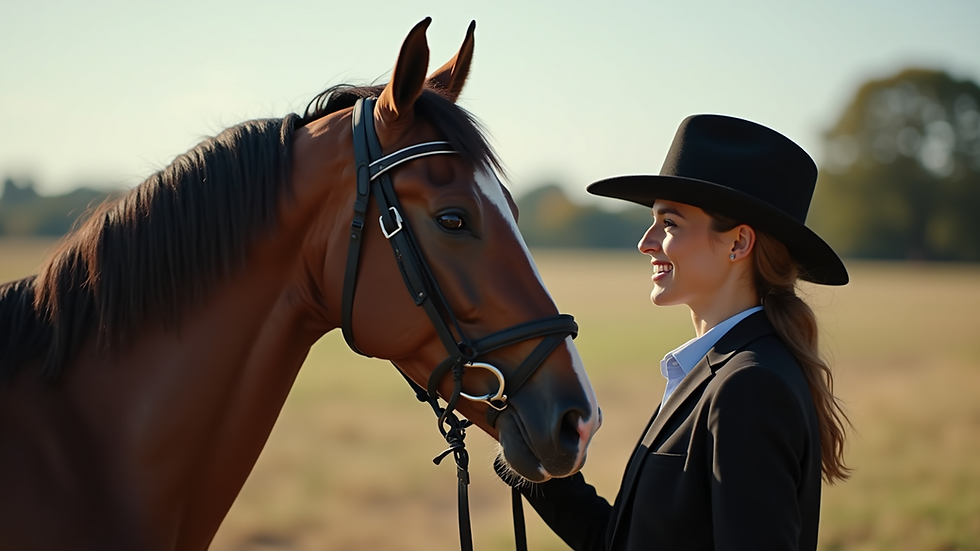Honoring the Spirit: Holistic Horse Training in New Hampshire
- Macy Johnson
- Jul 5
- 5 min read
Horse training is an art that goes beyond simple commands and techniques. It is about building a bond, understanding the animal's spirit, and nurturing a relationship that thrives on trust and respect. In New Hampshire, holistic horse training is gaining popularity as more trainers and horse owners recognize the benefits of this approach. This blog post will explore the principles of holistic horse training, its benefits, and how it can transform the relationship between horse and rider.
Holistic horse training focuses on the whole horse, considering its physical, mental, and emotional well-being. This method contrasts with traditional training, which often emphasizes obedience and performance. By honoring the spirit of the horse, trainers can create a more harmonious and effective training environment.
Understanding Holistic Horse Training
Holistic horse training is rooted in the belief that horses are sentient beings with their own thoughts and feelings. This approach encourages trainers to consider the horse's perspective and needs.
Key principles of holistic horse training include:
Mindfulness: Being present and aware during training sessions helps trainers connect with their horses on a deeper level.
Natural Horsemanship: This involves using techniques that align with the horse's natural instincts and behaviors.
Emotional Awareness: Recognizing and addressing the emotional state of the horse is crucial for effective training.
Physical Health: A horse's physical condition directly impacts its ability to learn and perform. Holistic training emphasizes proper nutrition, exercise, and veterinary care.
By integrating these principles, trainers can create a more supportive and nurturing environment for their horses.
The Benefits of Holistic Training
Holistic horse training offers numerous benefits for both horses and riders. Here are some of the most significant advantages:
Improved Communication
When trainers adopt a holistic approach, they learn to communicate more effectively with their horses. This improved communication fosters a stronger bond and enhances the training process. Horses become more responsive to cues, leading to a more enjoyable experience for both parties.
Enhanced Trust
Trust is the foundation of any successful horse-rider relationship. Holistic training emphasizes building trust through patience and understanding. As horses feel more secure, they are more willing to engage and learn.
Reduced Stress
Traditional training methods can sometimes create stress for horses. Holistic training focuses on creating a calm and supportive environment. This approach helps reduce anxiety and promotes a positive learning experience.
Better Performance
Horses trained holistically often perform better in various disciplines. When horses are relaxed and confident, they are more likely to excel in competitions or recreational riding.
Healthier Horses
Holistic training encourages a focus on the overall health of the horse. This includes proper nutrition, regular veterinary care, and appropriate exercise. Healthier horses are more energetic and willing to participate in training.
Practical Tips for Holistic Horse Training
If you are interested in incorporating holistic principles into your horse training, here are some practical tips to get started:
1. Observe Your Horse
Spend time simply observing your horse. Pay attention to its body language, reactions, and preferences. This observation will help you understand your horse better and tailor your training approach accordingly.
2. Use Positive Reinforcement
Positive reinforcement is a powerful tool in holistic training. Reward your horse with treats, praise, or affection when it responds correctly to a cue. This encourages the horse to repeat the desired behavior.
3. Create a Calm Environment
Ensure that your training environment is calm and free from distractions. A quiet space allows your horse to focus and feel secure during training sessions.
4. Incorporate Groundwork
Groundwork is an essential aspect of holistic training. It helps establish trust and communication before riding. Spend time working with your horse on the ground to build a solid foundation.
5. Be Patient
Holistic training requires patience. Horses learn at their own pace, and rushing the process can lead to frustration for both horse and rider. Take your time and celebrate small victories.
The Role of the Trainer
In holistic horse training, the role of the trainer is crucial. A good trainer must be empathetic, observant, and knowledgeable about horse behavior. They should also be willing to adapt their methods based on the individual needs of each horse.
Building a Connection
A successful trainer builds a connection with the horse. This connection is based on trust and mutual respect. Trainers should spend time getting to know their horses, understanding their quirks, and recognizing their strengths and weaknesses.
Continuous Learning
Holistic horse training is an evolving field. Trainers should commit to continuous learning, attending workshops, and seeking out new techniques. This dedication to growth benefits both the trainer and the horse.
Holistic Training in New Hampshire
New Hampshire is home to many trainers who embrace holistic methods. These trainers often offer workshops, clinics, and private lessons to help horse owners learn about holistic practices.
Local Resources
If you are interested in holistic horse training in New Hampshire, consider reaching out to local trainers or equestrian centers. Many organizations focus on natural horsemanship and holistic practices.
Community Support
Joining a community of like-minded horse owners can be incredibly beneficial. Many groups in New Hampshire focus on holistic training, providing support, resources, and shared experiences.
Real-Life Success Stories
Many horse owners in New Hampshire have experienced the transformative effects of holistic training. Here are a few inspiring stories:
Case Study 1: Bella and Sarah
Sarah adopted Bella, a rescue horse with a troubled past. Bella was fearful and untrusting. By using holistic training methods, Sarah focused on building trust and confidence. Over time, Bella became more relaxed and responsive. Today, they enjoy trail rides together, showcasing the bond they have built.
Case Study 2: Max and Tom
Tom struggled with Max, his spirited gelding. Traditional training methods led to frustration for both horse and rider. After switching to a holistic approach, Tom learned to communicate better with Max. They now work together in harmony, and Max has become a star in local competitions.
Embracing the Journey
Holistic horse training is not just about achieving specific goals. It is about embracing the journey and enjoying the process of learning together. Each horse is unique, and the training experience should reflect that individuality.
Celebrate Progress
As you embark on your holistic training journey, remember to celebrate progress, no matter how small. Each step forward is a victory worth acknowledging.
Stay Open-Minded
Be open to new ideas and techniques. Holistic training is about finding what works best for you and your horse. Experiment with different methods and approaches to discover what resonates with both of you.
The Future of Holistic Horse Training
As more horse owners and trainers recognize the benefits of holistic training, this approach will continue to grow in popularity. The future of horse training lies in understanding and honoring the spirit of these magnificent animals.
A Shift in Perspective
The shift towards holistic training represents a broader change in how we view our relationships with animals. By prioritizing empathy and understanding, we can create a more compassionate world for horses and their riders.
Join the Movement
If you are passionate about horses and their well-being, consider joining the holistic training movement. Whether you are a trainer, rider, or horse owner, your involvement can make a difference.
Final Thoughts
Holistic horse training is a beautiful journey that honors the spirit of the horse. By focusing on the whole animal, trainers can create a more meaningful and effective training experience.
As you explore this approach, remember to be patient, observant, and open-minded. The bond you build with your horse will be one of the most rewarding experiences of your life.

Embrace the journey, celebrate the progress, and enjoy the unique connection you share with your horse. Together, you can achieve great things while honoring the spirit of the horse.


Comments